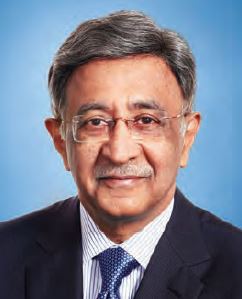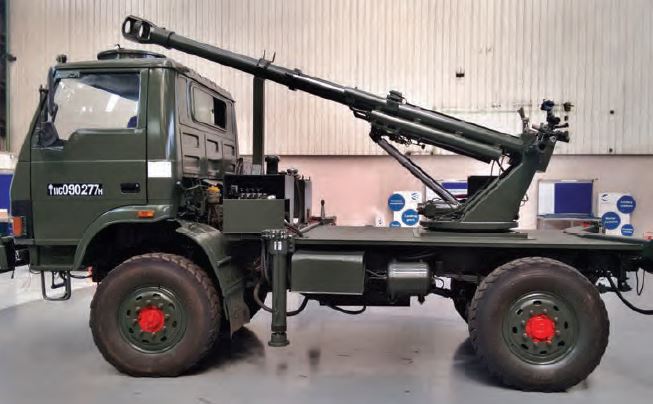Baba Kalyani
Biz@India
June 2016
“India and the Fourth Industrial Revolution”

Baba Kalyani, Chairman and MD, Bharat Forge
Founded in 1961, Indian multinational company Bharat Forge is one of the largest manufacturers and exporters of automotive components in the country. Chairman and managing director, Baba Kalyani, talks about the impact of the Fourth Industrial Revolution on India and its defence production amongst other concerns in global economy.
Where does an Indian multinational like yours fit into the ‘Fourth Industrial Revolution’?
Industrial revolution or Industry 4.0 is part of an ongoing transformation process. Just like, how in India we got from landlines to cell phones; nobody called that a transformation, but it was a major transformation of how communication could be done. This is exactly following that process, it’s largely getting developed based on flow of information, robotics, automation, Artificial Intelligence (AI) and machines talking to each other. Now you can almost create a factory with no people and make it work. So any global company like us, is fairly aware and adapting to this process. It’s a continuous process. The reason why people call it Industrial Revolution is because it’s a transformational change not an incremental change as this technology is now largely available to anybody on the planet. Firstly, being a flat world, knowledge and ideas flow pretty easily from one place to another. Secondly, whether you are Indian, Chinese, or whichever country you belong to, you are now spread all over the world. You are involved in many of the technology development processes like many Indians and Chinese are working in tech companies of California. To that extent it is fairly universal. The differentiation will come in how each country applies the technology. The application has to result in efficiency, better and lower cost products. In India we have certain conditions, in terms of skillset available, cost of skills, etc. whereas in Germany we might apply differently, as they have different skillsets and cost of skills. Everything is based on how to use information effectively. How do you get rid of the media gaps? In classic manufacturing there is information coming out of every manufacturing cell, but it doesn’t connect to the next one because there is a media gap. The smartphones, apps and the AI will close all these media gap and make things more efficient.
Would this pose challenges for political leaders who are trying to boost employment?
No. That’s a short-sighted view. Firstly, it will boost employment. Yes, advanced manufacturing uses less manpower but it uses highly paid people. So with large amount of advanced manufacturing your salary levels go up. From a factor driven economy, you become efficiency and innovation driven economy. The Gross Domestic Product (GDP) goes up, and the employment goes up. So it’s the reverse cycle of creating employment by creating wealth and employment.
How well placed is India in this whole scenario?
Largely, it depends on individual companies that are well placed in India. Many of them are quite technically savvy. The problem in India will come to the SME (small and medium enterprises) sector, because it has somehow remained slow on application of technology. It’s not lack of will, rather our infrastructure on technology is not good enough. So as the infrastructure improves, the application of technology will also improve in that sector.
Is the economy still in doldrums?
No. There is a volatility in economy globally, but many things have improved. The US economy is doing well. The drop in oil prices is a big boon to India, as that helps our current account deficits. It reduces our cost and competitiveness. The Indian economy is growing at 7.5 pc, Chinese is little under 7 pc. It is not that bad. But there is much volatility in the global economy, because there are many crisis in the world – whether it involves flight of capital, activities like Paris attacks, climate change and its impact on environment. This industrial revolution is bringing a lot of change in technology and processes. In the old days it was easy to plan. If you wanted to make ten thousand of this product, you knew what to do. Now you have 20 options! Which process to follow? If I want to invest in automotive – do I invest in electric cars, or in hybrid cars, or in the combustion engine? Many people say the combustion engine should be dead. This creates a lot of volatility and uncertainty. But from a market point of view, US had the biggest year in automotive history – 17 million vehicles last year. Indian automotive industry is growing at 10-11 pc. Everybody says China has slowed down. Now 6.9 pc growth in China on USD 10 trillion economy is USD 690 billion, it’s almost the economy of smaller European nations. It is all relative, it’s more a hype. It is true that situation has changed from 15 years ago when things were more predictable. Technology was a known factor, and there were no disruptions; innovative disruptions which disrupted technology. Just like shale gas disrupted the whole oil business.

The prototype for Bharat Ultra-Light Howitzer, The latest defence equipment from Bharat Forge made using light weight exotic materials like Titanium and Aluminium based alloys, was displayed at DefExpo 2016 in Goa
Which part of defence sector are you making investments in?
Our knowledge and technology is largely metallurgical. So land systems, components for equipment like aircrafts, combat vehicles etc. interest us. We are making field guns in India and are also talking to some other companies. We are working hard.
How is your relationship with France?
We have made a small manufacturing investment in France. We are learning about France. It has a high level of technology and very skilled people. We have been there now for a year and half, we need to understand the system better to understand what we can do.
The French government has announced some measures to make business easier. Are you satisfied?
I have a small investment in France, so anything that makes things easier is always welcome. I have no specific problems that I need immediate solutions to. That is largely for Multi-national Companies (MNC) who are looking for big ticket investments.
How do you see the Indo-French business ties? Is it really percolating down to the SMEs or limited to big players?
It will. As large companies come and become more active, SMEs will follow. Language is a deterrent, most SMEs in France wouldn’t know English. We have to bridge the cultural gap between India and France a little bit. Lot of exchanges are happening at cultural level and at the student level. And large companies from France are pretty much active in India, so it will follow.









